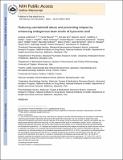| dc.contributor.author | Justinova, Zuzana | en_US |
| dc.contributor.author | Mascia, Paola | en_US |
| dc.contributor.author | Wu, Hui-Qiu | en_US |
| dc.contributor.author | Secci, Maria E. | en_US |
| dc.contributor.author | Redhi, Godfrey H. | en_US |
| dc.contributor.author | Panlilio, Leigh V. | en_US |
| dc.contributor.author | Scherma, Maria | en_US |
| dc.contributor.author | Barnes, Chanel | en_US |
| dc.contributor.author | Parashos, Alexandra | en_US |
| dc.contributor.author | Zara, Tamara | en_US |
| dc.contributor.author | Fratta, Walter | en_US |
| dc.contributor.author | Solinas, Marcello | en_US |
| dc.contributor.author | Pistis, Marco | en_US |
| dc.contributor.author | Bergman, Jack | en_US |
| dc.contributor.author | Kangas, Brian D. | en_US |
| dc.contributor.author | Ferré, Sergi | en_US |
| dc.contributor.author | Tanda, Gianluigi | en_US |
| dc.contributor.author | Schwarcz, Robert | en_US |
| dc.contributor.author | Goldberg, Steven R. | en_US |
| dc.date.accessioned | 2014-07-07T18:14:44Z | |
| dc.date.issued | 2013 | en_US |
| dc.identifier.citation | Justinova, Z., P. Mascia, H. Wu, M. E. Secci, G. H. Redhi, L. V. Panlilio, M. Scherma, et al. 2013. “Reducing cannabinoid abuse and preventing relapse by enhancing endogenous brain levels of kynurenic acid.” Nature neuroscience 16 (11): 10.1038/nn.3540. doi:10.1038/nn.3540. http://dx.doi.org/10.1038/nn.3540. | en |
| dc.identifier.issn | 1097-6256 | en |
| dc.identifier.uri | http://nrs.harvard.edu/urn-3:HUL.InstRepos:12406984 | |
| dc.description.abstract | In the reward circuitry of the brain, alpha-7-nicotinic acetylcholine receptors (α7nAChRs) modulate effects of delta-9-tetrahydrocannabinol (THC), marijuana’s main psychoactive ingredient. Kynurenic acid (KYNA) is an endogenous negative allosteric modulator of α7nAChRs. Here we report that the kynurenine 3-monooxygenase (KMO) inhibitor Ro 61-8048 increases brain KYNA levels and attenuates cannabinoid-induced increases in extracellular dopamine in reward-related brain areas. In the self-administration model of drug abuse, Ro 61-8048 reduced the rewarding effects of THC and the synthetic cannabinoid WIN 55,212-2 in squirrel monkeys and rats, respectively, and it also prevented relapse to drug-seeking induced by re-exposure to cannabinoids or cannabinoid-associated cues. The effects of enhancing endogenous KYNA levels with Ro 61-8048 were prevented by positive allosteric modulators of α7nAChRs. Despite a clear need, there are currently no medications approved for treatment of marijuana dependence. Modulation of KYNA provides a novel pharmacological strategy for achieving abstinence from marijuana and preventing relapse. | en |
| dc.language.iso | en_US | en |
| dc.relation.isversionof | doi:10.1038/nn.3540 | en |
| dc.relation.hasversion | http://www.ncbi.nlm.nih.gov/pmc/articles/PMC3835353/pdf/ | en |
| dash.license | LAA | en_US |
| dc.title | Reducing cannabinoid abuse and preventing relapse by enhancing endogenous brain levels of kynurenic acid | en |
| dc.type | Journal Article | en_US |
| dc.description.version | Version of Record | en |
| dc.relation.journal | Nature neuroscience | en |
| dash.depositing.author | Bergman, Jack | en_US |
| dc.date.available | 2014-07-07T18:14:44Z | |
| dc.identifier.doi | 10.1038/nn.3540 | * |
| dash.authorsordered | false | |
| dash.contributor.affiliated | Kangas, Brian | |
| dash.contributor.affiliated | Bergman, Jack | |


